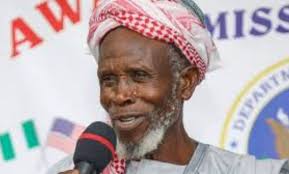
The Obi of Onitsha, His Royal Majesty Igwe Nnaemeka Achebe, says the centuries-old Ofala Festival must not only be preserved but reimagined as a cultural, economic, and spiritual event for generations to come, with over 600 years of history behind it, he believes the festival holds the key to community renewal, youth engagement, and even regional peace.
Speaking In an interview with ARISE NEWS on Monday, Achebe, detailed the deep historical and cultural significance of the Ofala Festival, while also addressing contemporary challenges facing Southeastern Nigeria.
“Ofala Onitsha is as old as the community, so going back some 600 years ago. “It comes up in the middle of the harvest season when we celebrate, particularly the New Year Festival. And of course in those days our community and literally all communities were very agrarian, Ophala comes up in the middle of the harvest season when we celebrate, particularly the New Year Festival.”
He explained that historically, the king lived in near isolation within the palace and would only emerge once a year to be seen by his people and receive their pledge of loyalty. “The monarch historically lived in near isolation within the premises of the palace, and he emerged once a year to be seen by his people and to see his people and to receive a pledge of loyalty.”
Achebe described his retreat, saying it is a time “during which I am cut off completely from the world. I sleep on the floor, in meditation with the ancestors and with God, reviewing the past year, seeking for God’s forgiveness, and asking for God’s blessings in the year ahead.”
He noted that the festival has evolved with the times, becoming not just a sacred event but also a cultural and economic opportunity. “And that’s the package that we have today. Obviously, by bringing the world to Onitsha, there is an economic side of it, lifestyle, tourism, and so on and so forth.”
On the inclusion of young people, Achebe emphasised that the Ofala has been deliberately adapted to ensure youth engagement and generational continuity. “Our young ones are part of it. If you saw the programme, they also had their own carnival on the day before Ophala.”
“It is a work in progress, and we are very mindful of that. Ofala has lasted for 600 years, and we want to make sure it lasts for another 600 years, and beyond.”
Addressing regional insecurity, Achebe acknowledged the economic toll of instability on the South East. “You’re quite correct, insecurity is a major challenge, has been a major challenge. In addition to the Anambra vigilante group, of which we have a contingent, we’ve also created our own Onitsha community vigilante group, and they work together to protect the community.”
“Their main purpose, being on the ground in the community, is intelligence, and they give intelligence to the police and other security agencies who then execute.”
He also disclosed efforts beyond Onitsha to stabilise the region. “I personally lead a small group, a small, very distinguished group of the South East, a joint body of the South East Council of Traditional Rulers and the representatives of the archbishops and bishops of Igbo origin. So the traditional and religious institutions coming together with the civic leaders also coming together, and we hold discussions, we reach out to the governors, we reach out to other stakeholders.”
Achebe lamented the economic paralysis caused by insecurity. “Onitsha is just basically half open. The shops are closed until later in the day, the banks do not open, and the markets do not open. And those are the two challenges that we need to crack to get economic life back.”
On the subject of preserving cultural legacies through physical institutions, he revealed ongoing efforts to establish museums dedicated to Ophala and his personal art collection. “We actually have a museum under construction. It’s been going on for over 10 years. Unfortunately, we took two steps forward and we got one step back because of the poor economic conditions in the country. The COVID set us back quite a bit, but as of today, it’s a massive structure actually, maybe overscaled, overscoped, but it’s roofed, it’s plastered, and we’re now going to finish it.”
He added that he is also working on a private museum at his residence. “Because having your collections in storage is like having books not on the shelf. People don’t have access to it. We have a large collection. We have a distinctive collection, both on the modern and contemporary arts, but also on the traditional side.”
Calling for support, he concluded, “If you can help us to call for funding, both national and international, that will help us. On my own part, I’m also trying to, in fact, it’s a work in progress. The architectural designs are almost complete. Basically, to create a private museum in my own personal residence, and people can have access to it also.”
“I think it will be a rich institution for people to come from all over the world to enjoy. So, it’s a work in progress. We need your help.”
Erizia Rubyjeana



